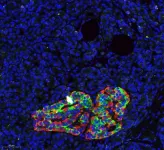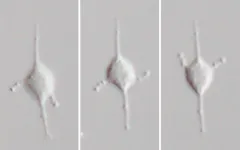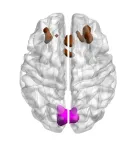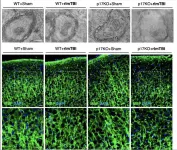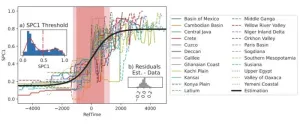(Press-News.org) Research introduces new DNA methylation-based method for accurately assessing cell composition in the human pancreas, addressing a critical gap in diabetes research. By overcoming limitations of traditional protein marker-based approaches, the study provides a more precise means to identify specific cell types. The findings offer insights into beta-cell dysfunction across diabetes types and have direct clinical implications, enhancing our understanding of diabetes development and potentially guiding more tailored treatment strategies. This innovative molecular alternative to immunodetection methods holds promise for broader applications in molecular biology and diagnostics.
[Hebrew University, Jerusalem, Israel] In a study published in Diabetes, Prof. Yuval Dor and his research team from Hebrew University have introduced a new approach for accurately assessing cell composition in the human pancreas and islets. The research addresses a critical need in understanding the genesis of diabetes and offers an alternative to traditional protein marker-based methods.
Current methodologies rely on the detection of protein markers, such as insulin, to identify specific cell types in the pancreas. However, the variability in protein content under different physiological and pathological conditions poses a significant limitation, complicating the accurate determination of cell numbers.
The study demonstrates the innovative use of cell type-specific DNA methylation markers to overcome these limitations. By identifying genomic loci uniquely demethylated in specific pancreatic cell types, the research team applied targeted PCR to assess the methylation status of these loci in human islet and pancreas specimens. This enabled a precise inference of cell type composition, offering a molecular alternative to traditional immunodetection methods.
The researchers looked at groups of cells in the pancreas called islets. They found that in people with different types of diabetes (pre-T1D, T1D, and T2D), the function of a specific type of cell called beta-cells was similar, but it was lower compared to people without diabetes. When they looked at pancreas tissues from people with recent-onset T1D, they found that the beta-cell function was within the normal range, suggesting a problem with these cells. In people with T2D, there were more of another type of cell called alpha-cells, but the beta-cell function was normal. This helps us understand how these cells work in diabetes.
Prof. Yuval Dor, the lead researcher, remarked, "The use of DNA methylation-based analysis not only provides a more accurate assessment of cell types in the human pancreas but also proves invaluable in interpreting insulin secretion assays. This method opens new avenues for understanding pancreas cell composition in both health and disease."
The study was led by graduate student Zeina Drawshy, Dr Agnes Klochendler and Prof. Yuval Dor from the Hebrew University, in collaboration with scientsts from Hadassah Medical Center, the University of Florida, the University of Pennsylvania and Li Ka Shing Centre for Research in Edmonton.
END
New DNA methylation-based method for precise assessment of pancreas cell composition
2024-02-06
ELSE PRESS RELEASES FROM THIS DATE:
Remarkable cellular architecture and phylogenetic position of the mysterious arm-swinging protist meteora sporadica
2024-02-06
Tsukuba, Japan—Meteora sporadica is a small, unicellular eukaryote (protist) that was discovered in deep Mediterranean sea sediments in 2002. It differs from known protists by the presence of two lateral arms that swing back and forth. However, the ultrastructure and phylogenetic position of M. sporadica remain unknown.
In this study, researchers successfully cultured and analyzed two strains of M. sporadica from marine sediments in detail. Ultratructural observations revealed ...
Mechanism of plants obtain nitrogen by supplying iron to symbiotic bacteria
2024-02-06
Tsukuba, Japan—Leguminous plants have a mechanism (rhizobial symbiosis) to efficiently acquire nitrogen, which is an essential macronutrient for growth, through the nitrogen-fixing bacteria rhizobia. Root nodules are organs on plant roots that facilitate the symbiotic relationship. Rhizobia coloniza these nodules and fix nitrogen by converting nitrogen from air into ammonia. Iron is needed for the enzymes that catalyze nitrogen fixation; however, where and how iron is transported to the nodule and used for nitrogen fixation is largely unknown.
In this study, using the legume model plant Lotus japonicus, a transcriptome ...
11 leading stroke scientists to receive American Stroke Association honors
2024-02-06
PHOENIX, Feb. 6, 2024 – Eleven scientists leading the way in stroke research will be recognized during the American Stroke Association’s International Stroke Conference 2024 for their exceptional professional achievements. The meeting will be held in Phoenix, Feb. 7-9, and is a world premier meeting for researchers and clinicians dedicated to the science of stroke and brain health.
The illustrious group of awardees includes four groundbreaking scientists who have devoted their careers to stroke research and six scientists will be recognized for their notable new research. The awards include the Ralph L. Sacco Outstanding Stroke Research ...
Powerful answers to energy questions may be blowing in the wind
2024-02-06
While wind farms have become a widely popular method of generating energy, researchers are now looking at the impact of these large farms on wind patterns and the surrounding environment.
Using large-scale simulations to better understand the way air moves across and within wind farms, researchers from UBC Okanagan and Delft University of Technology (TU Delft) in the Netherlands have developed a modelling framework that will help improve wind energy forecasts and productivity.
The researchers also hope to learn how large wind farms can alter natural wind patterns.
“Wind farms are getting so large that ...
Discover BMB announces exciting lineup of speakers
2024-02-06
Be front and center for the hottest research findings in the molecular life sciences at Discover BMB, the annual meeting of the American Society for Biochemistry and Molecular Biology, to be held March 23–26 in San Antonio.
Don’t miss this opportunity to hear from the top minds in the field. Reporters are invited to register for a complimentary press pass to attend #DiscoverBMB in San Antonio or access press materials electronically. Please note that only a limited number of complementary on-site press passes will be issued, so advance registration is recommended. Find more information in the #DiscoverBMB newsroom.
As part of an exciting program spotlighting the ...
Study finds strongest evidence to date of brain’s ability to compensate for age-related cognitive decline
2024-02-06
Scientists have found the strongest evidence yet that our brains can compensate for age-related deterioration by recruiting other areas to help with brain function and maintain cognitive performance.
As we age, our brain gradually atrophies, losing nerve cells and connections and this can lead to a decline in brain function. It’s not fully understood why some people appear to maintain better brain function than others, and how we can protect ourselves from cognitive decline.
A widely accepted notion is that some people’s brains are able to compensate ...
How T cells combat tuberculosis
2024-02-06
LA JOLLA, CA—La Jolla Institute for Immunology (LJI) is working to guide the development of new tuberculosis vaccines and drug therapies.
Now a team of LJI scientists has uncovered important clues to how human T cells combat Mycobacterium tuberculosis, the bacterium that causes TB. Their findings were published recently in Nature Communications.
"This research gives us a better understanding of T cell responses to different stages in tuberculosis infection and helps us figure out is there are additional diagnostic ...
Drug could protect brains from damage after concussions
2024-02-06
Repeat concussions, also referred to as repetitive mild traumatic brain injury, can lead to chronic traumatic encephalopathy (CTE) and raise the risk of Alzheimer’s disease. However, some people who experience repetitive mild traumatic brain injury never develop major disease. Onder Albayram and colleagues investigated the role of a protein known as p17 in protecting brains from long-term pathologies. In stressed neurons, p17 initiates production of C18-Ceramide, a bioactive sphingolipid that acts as a label of damaged mitochondria in neuronal axons. Labelled mitochondria are then detected and removed by autophagosomes. The authors knocked out p17 in mice. Some p17-knockout ...
Is there a typical rate of cultural evolution?
2024-02-06
Are cultural evolution rates similar across human societies? The emerging field of Cliodynamics uses mathematical models to study history. Tobias Wand and colleagues used a data-driven approach to estimate the rates of cultural evolution in 23 geographic areas, using data from Seshat: Global History Databank, which records nine “complexity characteristics” for 370 polities over 10,000 years, ending in the nineteenth century. The complexity characteristics are polity population; extent of polity territory; the size of the largest urban center; hierarchical complexity; the ...
Last chance to get hotel discounts for the world’s largest physics meeting
2024-02-06
Next month, scientists from around the world will convene to share new results from across the physical sciences in nearly 11,000 individual presentations. The American Physical Society’s (APS) March Meeting will be held in person in Minneapolis and online everywhere March 3-8.
Discounted hotel rates are available for in-person attendees at select Minneapolis hotels near the Minneapolis Convention Center. Book your hotel by Feb. 9 to receive the discount.
Press Registration
News media with valid APS press credentials may register for the meeting at no cost. To request press credentials, visit APS’s online newsroom. Registration ...
